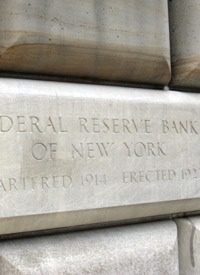
U.S. Treasury Secretary Timothy Geithner has some explaining to do. Both the New York Times and the British Telegraph have reported that e-mails going back to January 2009 show that the troubled insurance firm American International Group (AIG) received instructions from the New York branch of the Federal Reserve not to reveal certain details of bailout payments the company received courtesy of longsuffering American taxpayers.
In one of the e-mails, a Federal Reserve lawyer told AIG, “There should be no discussion” of certain transactions in a planned regulatory filing with the Security and Exchange Commission.
Geithner was at the helm of the New York Federal Reserve at that time. Taxpayers bailouts for AIG have swelled to as much as $182.3 billion.
The e-mails were made public late Thursday by Rep. Darrell Issa (R-Calif.), senior Republican on the House oversight committee. According to a regulatory filing dated December 24, 2008, AIG had planned to inform investors that it had paid counter-party banks to whom it owned money at a rate of 100 cents on the dollar for credit-default swaps they had entered into on behalf of clients.
{modulepos inner_text_ad}
AIG, working with the New York Fed, had created an entity called Maiden Lane III. The credit-default swaps served as insurance on debt securities held by numerous large financial institutions. Maiden Lane III had officially bought these debts, leaving the financial institutions in the clear. AIG would tear up the swaps.
One set of swaps, however, could not be torn up because they did not insure debts that could be bought by Maiden Lane III. Worth about $10 billion, they remain uncanceled and still in force.
The e-mails reveal that a New York Fed official deleted this information prior to publication. Also deleted was a paragraph about other investments that could not be unwound. Fed lawyer Ethan T. James (of Davis Polk & Wardwell) wrote in the margin, "There should be no discussion or suggestion that AIG and the New York Fed are working to structure anything at this point."
Congressman Issa stated, “It appears that the New York Fed deliberately pressured AIG to restrict and delay the disclosure of important information.” This comes two months after the revelation that the New York Fed was behind a decision to pay the banks in full, instead of at a discounted rate.
Securities lawyers are now pondering whether the New York Fed violated federal securities law, and if so, what to do about it. Joel Seligman, of the Securities and Exchange Commission, stated that companies are supposed to disclose all such information; disclosure rules apply to all public companies, with no exceptions made for those deemed “too big to fail” and are thereby on taxpayer-funded life support. The only narrowly tailored exceptions apply to trade secrets and anything that could jeopardize national security. “When an organization is troubled, it actually makes disclosures of this kind more important,” Seligman said.
A spokesperson for the New York Fed said late Thursday that what was offered was advice, not orders. “Our position has always been that if AIG’s securities lawyers determine that AIG is legally obligated to make a particular filing or disclosure, then that is what AIG must do.” Low-level tensions have long existed between banking regulators and federal securities officials. The former want to resolve issues behind closed doors. Federal securities law, however, calls for disclosure.
According to Rep. Issa, the secretiveness nevertheless flies in the face of sound public policy. He stated he wanted to bring Timothy Geithner to Capitol Hill to “get every side of the story and understand what the motive and intent was of these actions.” He defended taxpayers’ right to know. As part of the bailout of AIG, the government — i.e., taxpayers — took a 79.9 percent stake in the company.
Meg Reilly, speaking on behalf of the Treasury Secretary, stated in an e-mail that "Mr. Geithner played no role in these decisions and indeed, by Nov. 24 [the date he was nominated for the position by President Elect Obama], he was recused from working on issues involving specific companies, including AIG."
The New York Fed insists its reasons for deleting the reference to the $10 billion in swaps is innocuous. New York Fed General Counsel Thomas C. Baxter said, "Our focus was on ensuring accuracy and protecting the taxpayers’ interests during a time of severe economic distress. All information was in fact disclosed that was required to be disclosed by the company, showing that the counterparties received par value. There was no effort to mislead the public."
According to Elijah Cummings (D-Md.) of the Oversight and Government Reform Committee, Geithner should testify before Congress. Bloomberg.com has reported that Rep. Cummings wrote to Committee Chairman Edolphos Towns (D-N.Y.) that "it is essential to know what knowledge or involvement now-Secretary of the Treasury Geithner had in the decisions made by New York Fed officials to exclude information" from AIG’s regulatory findings. Rep. Cummings was among the first lawmakers to expose AIG’s plan to pay employees $1 billion in retention bonuses. President Obama demanded that the payments either be blocked or recovered. The firestorm of criticism compelled Edward Liddy, then CEO of the company, to step down in August.
Photo: AP Images



